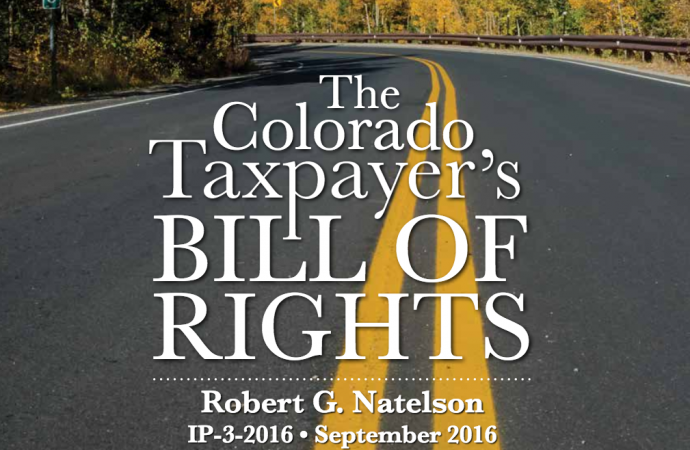In suits involving the state constitution’s Taxpayer’s Bill of Rights (TABOR), the Colorado Supreme Court has a nearly perfect record. It virtually always rules against the taxpayers.
The court’s latest decision continues the pattern.
TABOR lets voters approve or reject most tax and debt increases and certain government spending hikes. But since the people added TABOR to the Colorado constitution, the state’s judiciary has never treated it fairly. For many years, the justices even refused to refer to TABOR by its correct name, instead calling it “Amendment 1,” its 1992 ballot designation.
The court’s September 23 decision, Griswold v. National Federation of Independent Business (NFIB), illustrates how the state judiciary mistreats TABOR.
In that case, the NFIB challenged a 1983 Colorado statute allowing the secretary of state to fix his or her own business registration and licensing charges. The statute permitted the secretary to set the charges at whatever rate he or she thought needed to cover office expense. The secretary of state largely determined the level of office expense.
The registration and licensing charges are called “fees,” but they are really taxes. As traditionally defined in Colorado, fees are financial exactions from which the revenue is devoted to regulating or benefitting those who pay them. But most of the secretary of state’s registration and licensing revenue goes to unrelated expenses, such as administering elections.
Even without regard to TABOR, the 1983 statute is of dubious constitutionality. This is because it was an attempt to grant taxing power to an executive branch official. The Colorado constitution specifies that legislative powers, which include taxation, are vested in the general assembly alone.
However, the Colorado Supreme Court’s latest case addressed only the constitutionality of the 1983 statute in light of TABOR. The NFIB argued that the secretary of state’s charges were taxes, and that the secretary had raised them without asking the voters for permission. The NFIB also pointed out that since 1983 revenue from those taxes had jumped fourfold. TABOR’s revenue and spending limits required a revenue increase of that size be presented to the voters.
The district court, ruled against the taxpayers, as in TABOR cases Colorado courts nearly always do. The Colorado Court of Appeals also ruled against the taxpayers. However, the latter tribunal did grant the NFIB a chance to present more evidence on some points.
The Supreme Court affirmed the lower panels’ anti-TABOR decisions while reversing the appeals court’s grant of permission to present more evidence.
If you read enough Colorado Supreme Court TABOR opinions, you notice at least three recurrent motifs: (1) taxpayers always lose, (2) the court’s opinions are often evasive or unclear as to exactly why the taxpayers should lose, and (3) after creating an anti-TABOR precedent, the justices then stretch it to create even more anti-TABOR precedents. All those motifs appear in the NFIB:
* Whether the fourfold hike in revenue/spending required a public vote should have been obvious from publicly-available records. It is unclear why more evidence was necessary. But if the court decided that more evidence was needed, it was unfair to deny the NFIB an opportunity to present it.
* Whether a government exaction is legally a “fee” or a “tax” was central to the case and is crucial to many other TABOR disputes. Yet the Supreme Court evaded the issue. A cynic might think this was because the secretary of state’s charge was clearly a tax, but the justices didn’t want to award TABOR a victory by admitting it.
* In holding that the secretary of state’s taxes didn’t require voter approval, the justices mis-applied their own precedents. Earlier cases had held that tax hikes pursuant to a legal formula adopted before 1992 don’t violate TABOR. Those cases required that the formula be fixed, and not subject to discretion. In the NFIB case, the secretary of state had full discretion to determine his or her own expenses, and to raise taxes to meet them. But the court applied the “formula” cases anyway.
As I pointed out in my 2016 book on TABOR, the Colorado judiciary consistently has proved itself unable or unwilling to treat impartially constitutional limits on borrowing, spending, and taxes.
In that book, I suggested that TABOR advocates consider reforms to shore up the Taxpayer’s Bill of Rights and assure that it receives more impartial treatment in the courts. Enacting those reforms would require sponsoring citizen initiatives.
Sponsoring citizen initiatives is hard work. But it is far better than wasting time and resources prosecuting cases before judges who never let you win.








